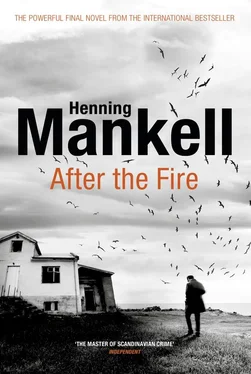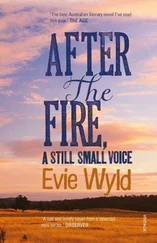‘Have you always been waiting for the moment when you can start setting fire to houses, and perhaps killing people at the same time? Has it always been your dream? Is that what you thought about as you travelled around with your letters and magazines and pension payment slips? Did you think that one day you would turn into a completely different person — the good, kind postman who becomes evil?’
Jansson didn’t say a word.
‘That shirt in your laundry basket might not be enough to convict you,’ I went on. ‘But I’m sure the police will find further proof. Unless of course you decide to confess. They’ll lock you up for years. Given your age, you’ll probably die in prison. Or maybe they’ll decide you’re insane, in which case they’ll put you away indefinitely in a mental institution, along with other crazy people. Mind you, going to prison isn’t the worst thing; you could probably cope with that. But can you live with the fact that people out here in the archipelago will hate you? That the only memory you will leave behind is the image of a wicked man who stopped delivering the post and started burning down the beautiful houses on these islands?’
Jansson was no longer pretending that he didn’t understand. He was slumped on the bed, his hands resting heavily on his knees, his head drooping. ‘Why?’ I yelled. ‘Why did you call me with a handkerchief over your mouth and warn me about the police?’
He didn’t respond. He was motionless, as if he had turned to stone, fixed in a denial that couldn’t be smashed to pieces with a hammer.
I stood by the door feeling every bit as helpless as I presumed Jansson himself was feeling.
‘Why?’ I said again. ‘Why did you want to kill me?’
He straightened up and looked at me with nothing but surprise.
‘I didn’t want to kill you. Why would you say such a thing?’
‘I was asleep. I could have burned to death.’
‘I would have helped you out. If you hadn’t woken up.’
‘So you stood there watching the fire take hold?’
‘I was waiting for you to wake up.’
I tried to imagine the scene: I had come rushing out of the raging inferno wearing mismatched wellington boots, and Jansson had been standing there in the shadows. Only then did he leave, returning before long to help put out the fire.
He was still looking at me, but he was gazing beyond me, far into the distance, at horizons known only to him. I would never find out why he had done what he had done. There were no answers, least of all in his own head. A light had gone out within him; a darkness had come creeping in, a darkness that he wanted to illuminate from the outside, with torches in the form of burning houses.
Jansson got to his feet; I stepped aside. I watched him walk slowly down to the jetty. For the first time ever I saw him move without purpose.
The boat reversed away from the jetty. I went up to my grandfather’s bench. It was too cold to sit down; I simply stood there looking out to sea as the ice floes drifted by. Nothing was in a hurry any more.
I wondered what to do. I ought to call Alexandersson and inform the coastguard, of course, but I couldn’t do it. I had to understand this myself before I could expect anyone else to do so. I couldn’t just ring up and announce that Jansson was the guilty party; no one would believe me.
I imagined myself sitting in the caravan with Alexandersson, telling my story. He would simply stare at me, then he would ask if I could really prove what I was alleging. A shirt that smelled of petrol was not enough.
The story in my head just wouldn’t make sense to anyone else. The fact that to me it all seemed to fit together wouldn’t help at all.
I knew that Alexandersson would ask why Jansson had set fire to our homes.
Why?
My response had to be that I didn’t know. Only Jansson himself could answer that question.
What would happen if he was arrested? There would be an initial sense of relief throughout the community, but this would soon be followed by a feeling of angst because one of the archipelago’s most trusted inhabitants had turned out to be the perpetrator.
If Jansson was the arsonist, who could we trust in future? Something would come to an end out here on the islands, perhaps the last thing that was holding us together. Trust, a willingness to provide support for anyone who needed it — and not just by carrying each other’s coffins when the time came.
In my mind I could see everyone huddled together on their jetties or in the harbour. Our impotent attempts to understand. No doubt more than one person would angrily say that we should go and burn down Jansson’s house on Stångskär, but of course no one would be prepared to do it.
I thought about Jansson with a mixture of rage and astonishment. His loneliness had been so much greater than mine after all.
Time passed. I still didn’t say anything. No one seemed to suspect Jansson. According to what I heard, the police had no leads; the investigation into the arson attacks was going nowhere.
I considered sending an anonymous letter to the police, accusing Jansson. I didn’t do it, though; I didn’t quite trust my own judgement, mainly because deep down I still couldn’t believe that Jansson was a completely different person from the man we had all thought he was.
I wondered if he was ill. Could he have developed a tumour that had damaged part of his brain and distorted his thought processes? I dreamed more than once that he had set fire to the caravan, and that I ran screaming out into the night.
On 30 April, Walpurgis Night, Kolbjörn arrived on his cattle ferry with his son Anton and one of Anton’s friends. Together we managed to get the caravan on board. Kolbjörn had brought along an electric cable, which he ran from the island to the skerry. He chuckled at the thought that this was completely illegal but assured me there was no risk of dangerous short circuits.
We towed the ferry across with my launch; Kolbjörn took several photographs on his phone.
‘It’s forty-five years since we last transported cows on this ferry,’ he said. ‘But my father always insisted we should keep it; you never know when it might come in useful. And here we are, using it to move a caravan.’
He stood in silence for a moment, contemplating his ferry.
‘It’s weird,’ he said. ‘The police haven’t got a single lead or a single suspect for the arson attacks.’
‘I suppose it’s not that easy,’ I replied. ‘No one seems to have gained anything from the fires.’
Kolbjörn pulled a face and shook his head.
‘I’m trying to understand, but it’s impossible. I’m sure they’re doing their best. Maybe we should all take a practical approach, like Jansson.’
I gave a start when he mentioned Jansson’s name, but he didn’t seem to notice.
‘Why, what has Jansson said?’
‘He’s written a letter to the council, suggesting that they provide everyone who lives out here during the autumn and winter with a fire extinguisher, free of charge.’
‘Really?’
‘I think it’s a very sensible idea.’
It crossed my mind that I was going crazy. Where was Jansson heading with this? Why was he mocking the residents of the archipelago?
‘I think the council will give us our fire extinguishers,’ Kolbjörn went on. ‘But I don’t suppose Jansson will get any thanks for it.’
‘No,’ I said. ‘I don’t suppose he will.’
My voice was unsteady. Kolbjörn glanced at me. I smiled. The smile said: I’m absolutely fine.
Kolbjörn had carefully prepared the ground on the skerry. He had laid out a track made of thick planks of wood and had set up a complex block and tackle system. Everything worked perfectly, and the caravan was soon settled in its new home. Kolbjörn connected the electricity while I opened a bottle of champagne. We drank a toast as if it had been schnapps.
Читать дальше












